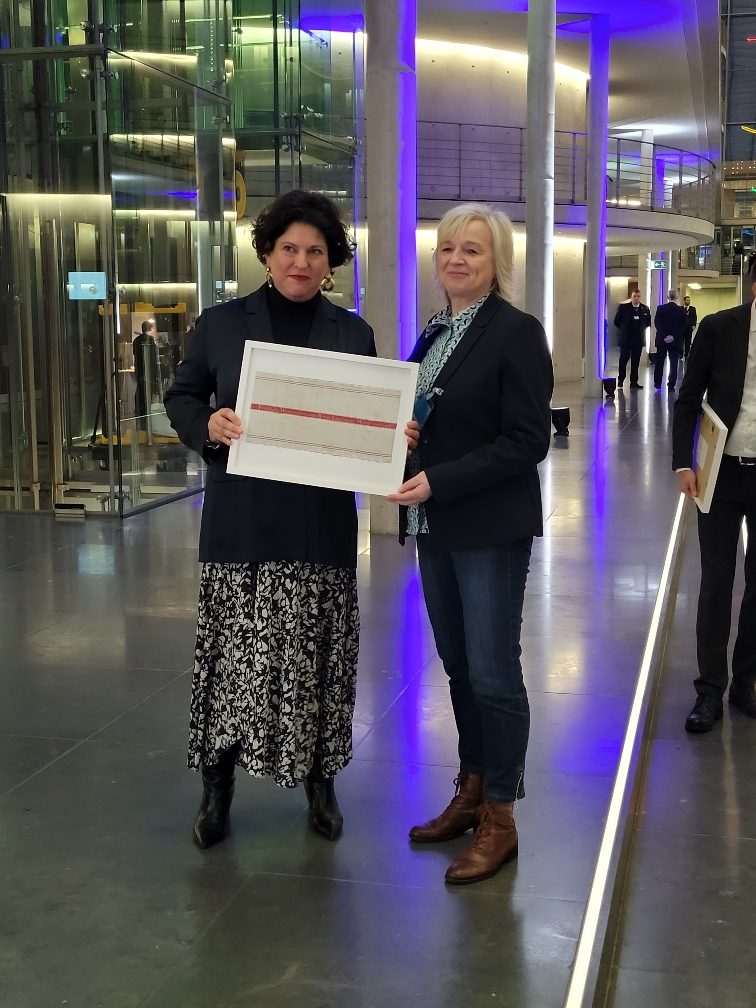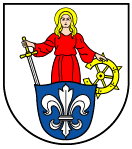Exhibition at the Yad Vashem Holocaust Memorial shows objects from Jewish families
Wolmirstedt (pm) l A towel from Wolmirstedt has recently become part of an exhibition in the German Bundestag in Berlin to mark the 70th anniversary of the Holocaust memorial Yad Vashem in Jerusalem. The towel once belonged to the Jewish Laufmann family from Wolmirstedt, who escaped from Nazi Germany and later gave the towel to the memorial. The occasion for the exhibition is the Memorial Day for the Victims of National Socialism on January 27.

Wolmirstedt’s mayor Marlies Cassuhn and museum director Annette Pilz were guests at the exhibition opening last week, and both were as enthusiastic as they were concerned. The mayor said: “I am impressed by the exhibition, which is well worth seeing and very professionally designed, and I am pleased that our city of Wolmirstedt is a part of it. Jewish life is traced here from a completely different and personal point of view. An everyday object tells us a story. We should take advantage of the fact that our city is represented in this exhibition, in which significant individual fates are presented.” First and foremost, this includes remembering and reminding people that this history must not be repeated, especially in light of the fact that fewer and fewer Holocaust survivors are able to recount the atrocities.
In this context, the mayor recalled the very vivid exhibition on the stranded train in the Wolmirstedt Museum and the erection of the memorial stone in Farsleben: “I have an idea: I would like to bring the towel to Wolmirstedt on loan – even if only for a few days – and in this way represent the personal fate of the Laufmann family.”
He said each councilman should receive a photo of the towel soon.
Impressed by the visit to the Bundestag, Annette Pilz said: “Seeing these 16 objects was a very special unforgettable experience. For the first time, objects from Yad Vashem are coming to Germany – and this time Wolmirstedt is there, representing Saxony-Anhalt.”
The exhibition “Sixteen Objects – Seventy Years of Yad Vashem” was conceived by the Friends of Yad Vashem and the Yad Vashem Museum and is on view until February 17. According to the organizers, the total of 16 exhibits “will be taken home for a while” and thus return to their place of origin. Each of the 16 objects that once belonged to a family or a person represents a German state. The exhibits, which are returning to Germany for the first time, are intended as a reminder that every German city lost a part of its history, its identity, with the Holocaust.
Hermann and Machela Laufmann lived with their two children in Wolmirstedt since 1924. They ran a successful clothing and shoe business. The large store and her apartment were located in Stendaler Straße (today’s August-Bebel-Straße). Hermann Laufmann befriended the Wolmirstedt dignitaries. But already in the 1930s anti-Semitism grew in Wolmirstedt, too, although there were only two Jewish families in the town. The Laufmann family was targeted by youths who increasingly harassed them: they beat up Hermann Laufmann and vandalized the store, smearing the windows with tar. The frightened family decided to leave Germany as early as 1931. She organized immigration documents to France and left Wolmirstedt in the middle of the night, along with her belongings. A grandson of Hermann and Machela Laufmann presented the towel to Yad Vashem.
The exhibition will be on display from January 25 to February 17, Monday through Friday, 9 a.m. to 5 p.m., at the German Bundestag in Berlin, Paul-Löbe-Haus, West Entrance, Konrad-Adenauer-Strasse 1. Registration for the visit and participation in a guided tour is required (telephone 030/227-38883 or e-mail ausstellungen@bundestag.de.






